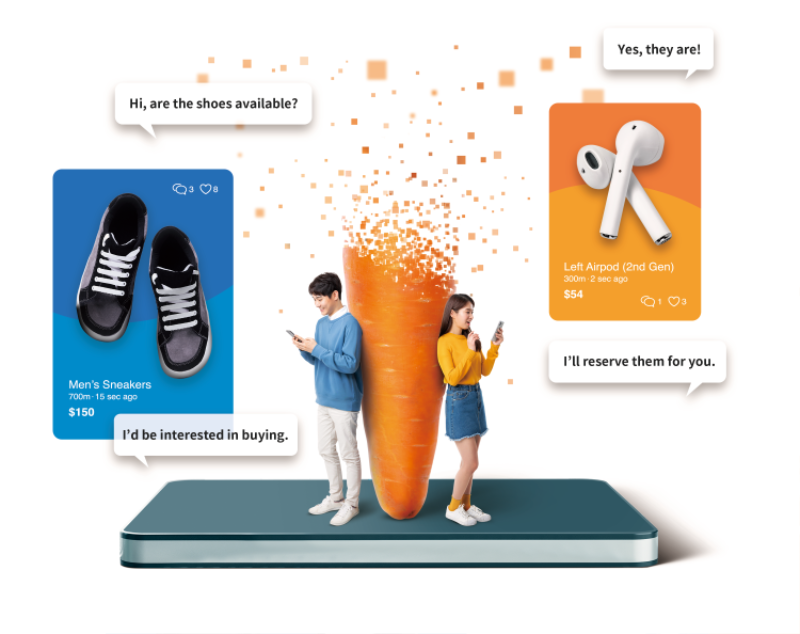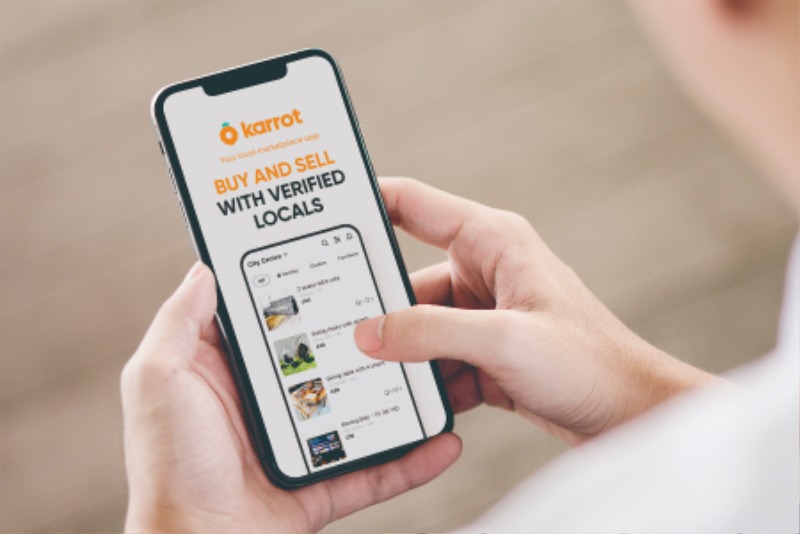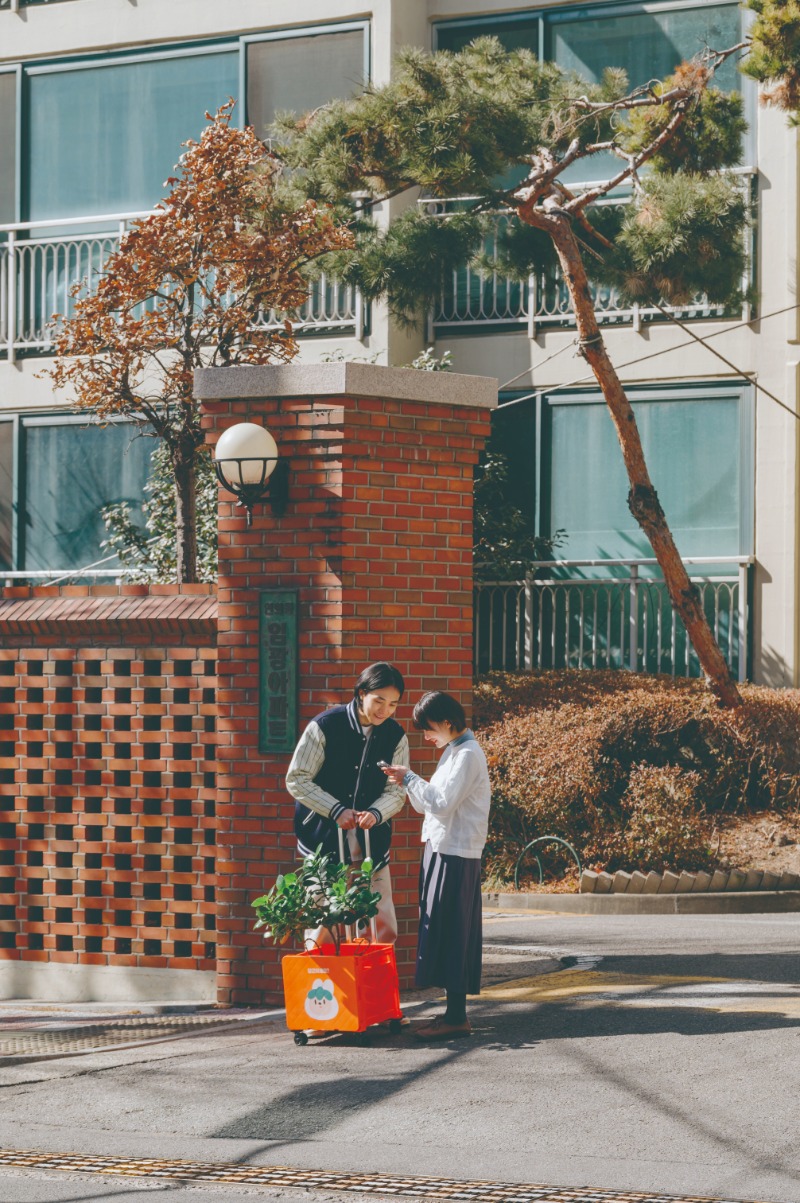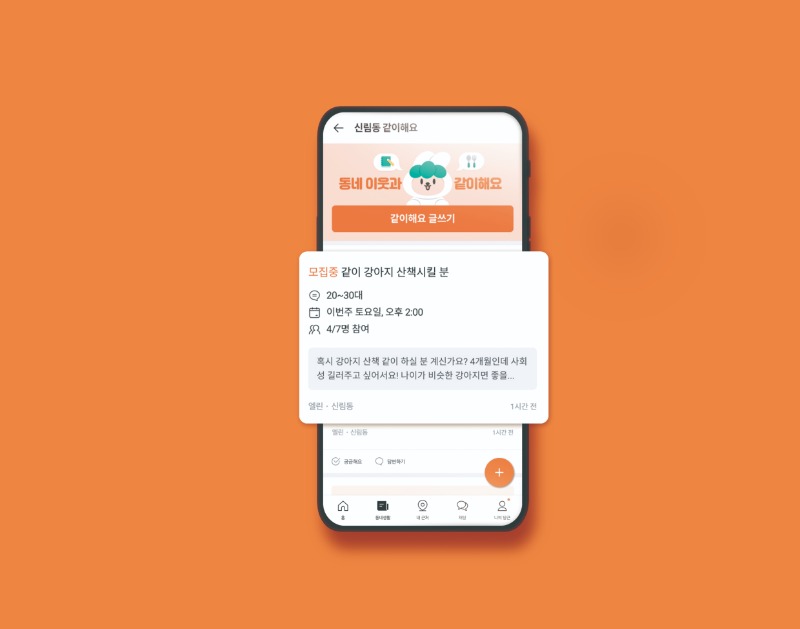Shoppers for secondhand goods and personal services are embracing a touch of nostalgia, recalling a time when commerce and personal relationships were centered within their community, creating a virtuous circle of support.

“Three thousand won for two Pokémon bread stickers,” asks a seller on Danggeun Market, an online platform. The Pokemon buns sell for 1,500 won each at convenience stores but have emerged as a hot item among Danggeun subscribers whose main interest is the free stickers that come with them. The craze for collecting Pokemon stickers has returned after the first boom in the late 1990s.
Exchange on the Danggeun platform is not limited to trading goods. For example, when the New Year comes round people post good wishes with the hope of sharing good fortune for the New Year. There are also people who post messages to share their childhood memories. Use of the internet to trade secondhand goods or obtain services was introduced decades ago. But these days, buyers and sellers are putting a premium on proximity and familiarity. The buzzword is “hyperlocal.”
“Danggeun” is the Korean word for “carrot.” It’s no exaggeration to say nearly every Korean household uses Danggeun Market’s mobile app, called Karrot. In the last official count available, Korea had 23 million Karrot users among its 21.5 million households in 2020. “Are you a Karrot?” or “Do you Danggeun?” is often heard among acquaintances looking to trade, buy or sell. In addition to dealing in secondhand goods from clothes to cars, Danggeun Market users can tap their Karrot app for a broad range of services, including delivery of fresh produce, property listings, cleaning and tutoring, as well as neighborhood information.

A video capture of Karrot, Danggeun Market’s mobile app that was available in four countries – the United States, Canada, the United Kingdom, and Japan – by the first half of 2022.
New Unicorn
Seoul-based Danggeun Market was founded in 2015 by two employees at Kakao, the top instant messaging service in Korea. At the time, secondhand trading online was dominated by Joonggonara, which began in 2003 as a virtual cafe on Naver, the country’s largest portal site. Its main rival was Bunjang, founded in 2010.
From the beginning, Danggeun Market strived for a community feeling. Danggeun is also theshortened form of a Korean phrase that means “somewhere near you.” The platform only provides listings of sellers in a radius of 4 to 6 km and employs user identification systems. Shoppers can use the online GPS service to locate sought-after items in a direct link-up with sellers.
Many Karrot users end up completing transactions in person and developing a relationship that leads to more deals. This is the exact aim of Danggeun Market’s blueprint – conclaves of community trading and support.
As Danggeun Market reshaped mobile e-commerce, the number of monthly Karrot users jumped from 500,000 in 2018 to 1.8 million in 2019 and to 4.8 million in 2020. It reached a whopping 17 million in March 2022, boosted by the pandemic. Millions of people working from home because of COVID-19 lockdowns meant that many households began to reduce clutter to create more free space. Danggeun Market was a perfect way to dispose of used goods without traveling far or risking exposure to the virus. In 2021, with the pandemic making the thought of being in packed subway cars and buses unappealing, the most searched keyword in the secondhand marketplace was “bicycle.”
In another move toward convenience, Danggeun Market introduced its own simplified payment service in late 2021. Called Danggeun (or Karrot) Pay, it affords real-time cash transfers and confirmations. Users no longer need to exchange bank account information or operate a separate banking app to verify payments. The payment service began on Jeju Island, where the proportion of Danggeun users in the total population is exceptionally high.
Danggeun Market’s success has attracted more than $200 million in private funding. With an enterprise value exceeding $2 billion and about 100 employees, it became a Korean “unicorn” last year, a privately owned startup with a valuation of more than $1 billion.
This capital will be used for aggressive overseas expansion. The strategy is to target cities that mirror those in Korea – places with dense populations of environmentally conscious people who want to reuse old goods. Karrot has been undergoing testing in Britain, Canada, Japan and the United States since 2019.
By facilitating recycling through secondhand trading, Danggeun Market has so far reduced 7.2 million tons of greenhouse gases, equivalent to having planted about 52.4 million trees, a spokesman said. This complies with the “environment, society and governance” criteria that are trendy among Korean companies, investors and the general public. Another factor stirring interest in secondhand transactions is rising prices. Secondhand goods are a way to cope with inflation and a fickle job market, especially among young adults. Events influenced by yard sales or flea markets in North America have already begun popping up in Korea.

“Are you a Karrot?” is often heard among users who want to buy or sell secondhand goods directly from others in their neighborhood.
More than a Flea Market
Taking their community approach further, the founders have encouraged the use of Karrot as a place for neighbors to share information via the platform’s “Neighborhood Bulletin Board.” There, subscribers can find all kinds of information about their area, such as real estate listings and job openings, and share personal advice and opinions.
“I’ve tested positive for coronavirus in a rapid antigen test. What should I do now?” somebody asked on the online bulletin board. One user answered, “You can get a consultation at a clinic or hospital and go to a designated pharmacy to pick up your medication in person.” Another user consoled the patient, saying, “Are you very sick? I hope you get well soon.” All of them live in the same neighborhood. In the fourth quarter of 2021, the number of bulletin board postings increased twofold over the year before.
Danggeun Market has also designated the 11th day of each month as a “Day of Sharing,” when items are given away for free. There were nearly four million instances of such sharing in the fourth quarter of 2021, up 82 percent year-on-year.
In one story, a family displaced by a fire in their apartment building had no time to grab any household items before fleeing the blaze and ended up in temporary housing provided by their district government. On the bulletin board, one person offered free household utensils and ended up also providing gift cards and side dishes that could accompany any meal.
Meanwhile, another very convenient Karrot service is a program that strengthens bonds between small business owners and local residents. Lively feedback posted by residents on their visits to restaurants or stores in the neighborhood and various discount offers are helping to rejuvenate local economies.

Amid the COVID pandemic, sales of secondhand goods boomed as people uncluttered to facilitate their new work-from-home routine and raise cash to weather the downturn in economic activity.

Danggeun Market strives for a community feeling by letting users not only by letting users trade second-hand goods but by providing a sense of convenience to neighborhood life.
Building Trust
Of course, the online consumer-to-consumer (C2C) flea market business isn’t perfect. The high interest in secondhand goods can attract scammers or fraudsters with shoddy goods and services. When that occurs, participants in C2C trading have to resolve disputes themselves or file a complaint with the authorities.
Ethical issues can also arise; in one case, when the vaccine pass mandate was still in effect last year, an unvaccinated person posted a message offering money for the portal ID of a fully vaccinated person. Another person who had tested positive for coronavirus attempted to sell his own used COVID-19 home test kit to anyone seeking a free PCR test or a few days off work based on a positive COVID test result.
To build and maintain an environment in which users can trust each other, Danggeun Market collaborates with the National Police Agency and the Ministry of Food and Drug Safety. Using machine learning technology, it filters and blocks illegal content. When someone provides incorrect personal information or is found to have been involved in a criminal case, a warning message pops up immediately in a chat window. Subscribers talking to a user who has been punished for a sales scam will receive a message regarding the earlier case to prevent potential damage. And those who have caused problems are restricted immediately from using Danggeun Market’s services.